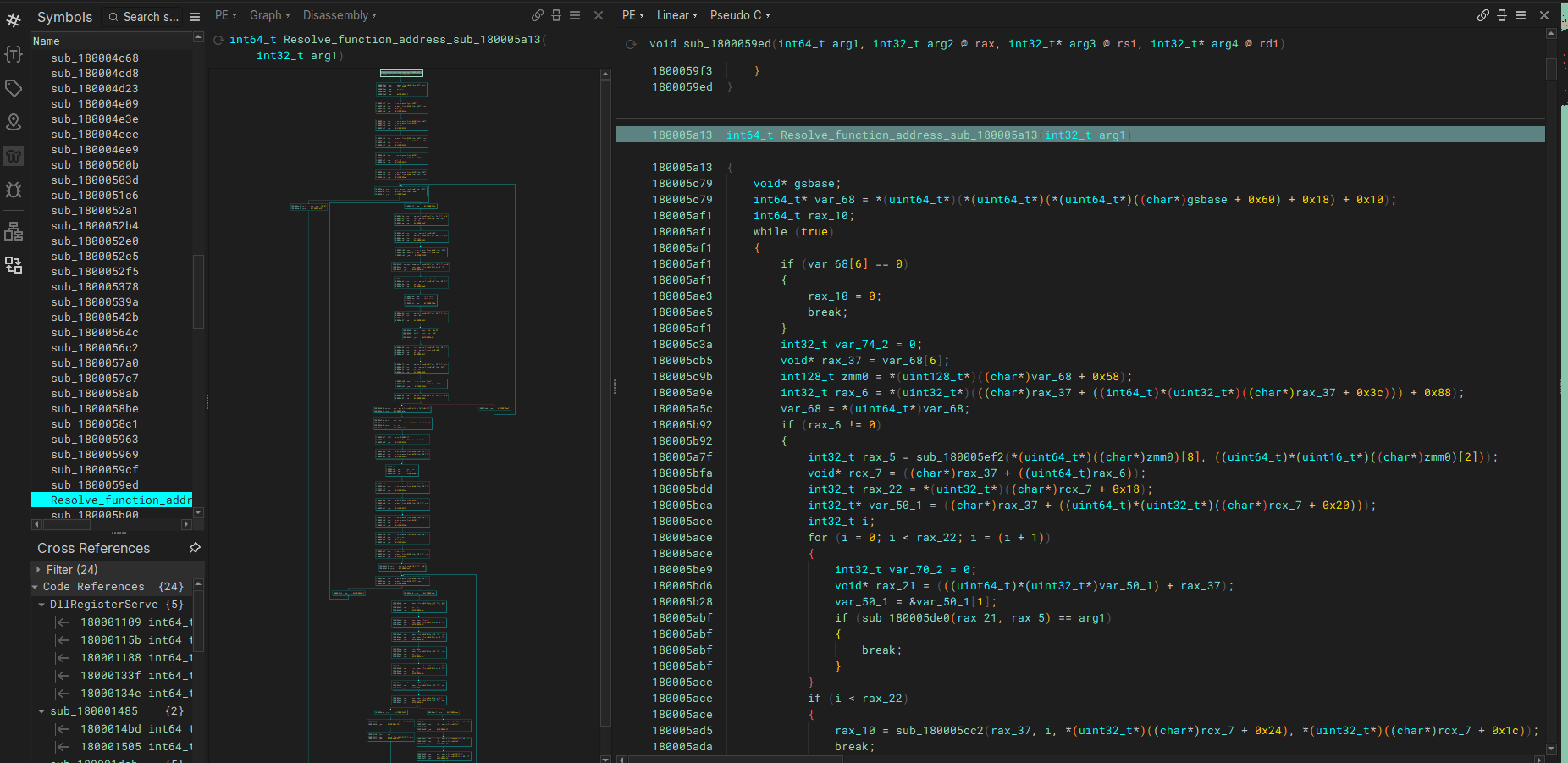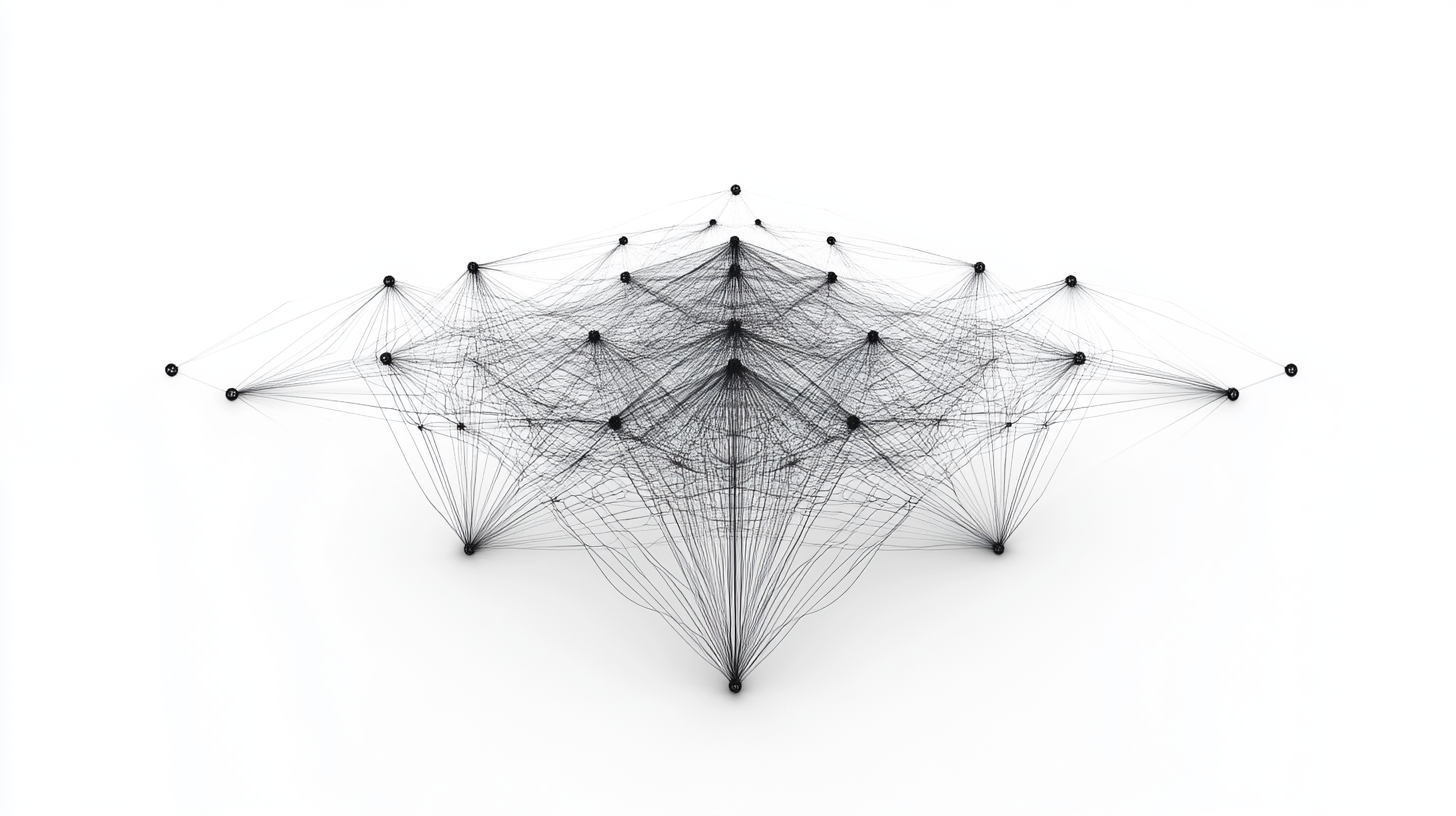
Description
This post aim to just remove obvious opaque predicates in control flow graph. Using Binary Ninja, it is possible to patch to de-obfuscate the sample since the strategy used is the same.
HASH : 0581f0bf260a11a5662d58b99a82ec756c9365613833bce8f102ec1235a7d4f7
The Pattern
Firstly, the basic blocks are really fragmented which are glued together via conditional and unconditional jumps. For unconditional jump statements, there are instances where ONLY one path is taken for all cases. Notice how there are a few comparisons whereby left equals right via cmp instruction which would always set zero flag to zero. Depending on the jump conditions, it would only go down ONE path.
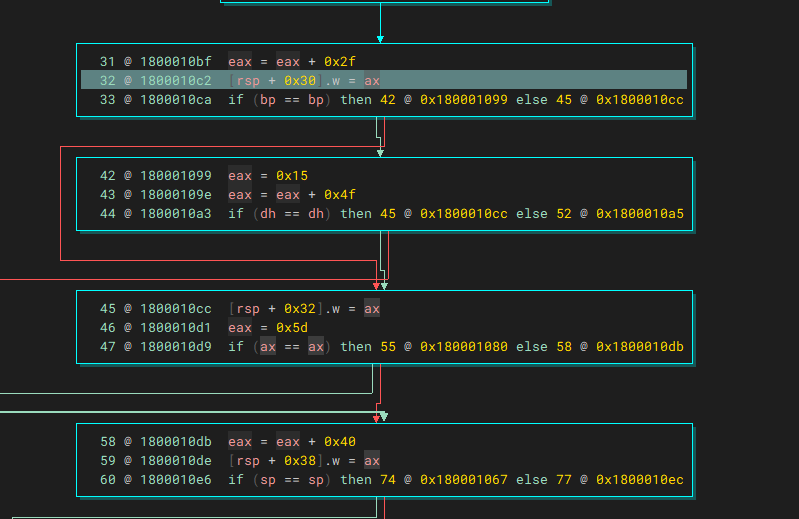
To understand this, we can reference the instruction graph for this comparison. The main IL Operation is LLIL_IF to check for the condition of LLIL_CMP_E. In the script, we should cover all the different IL related to CMP. The pattern exists where the left and right operands are of LLIL_REG which we can double check. Finally, to detect this, we can also make sure that the src for both left and right are the same which is the pre-requisites for the opaque predicate.
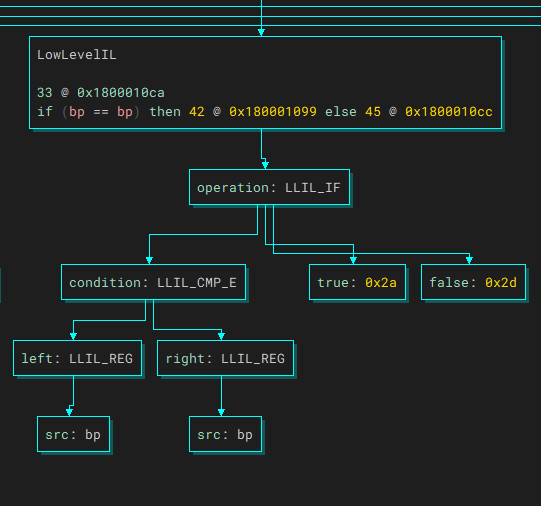
Changing Control Flow
We can make use of the always_branch and never_branch from the patch menu which can also be done so programmatically.
bv.always_branch(<instr>.address)
bv.never_branch(<instr>.address)What it does is to patch to become an unconditional jump to the true statement (always_branch) or false statement (never_branch).## Writing the Script
We have to keep track of the locations to patch with the *_branch API.
for f in bv.functions:
func = f.low_level_il
patch_locations = []
for bb in func:
for instr in bb:
if handle_cmp_same_regs(instr):
print()Next, we can parse the instruction in Low Level IL as per the IL Graph shown in the previous section. Note that when appending the patch location, I have added another value (1 or 0) to indicate if we should always branch or to never branch. This ensures that the unconditional jump statement would jump to the correct location. Also, the different CMP conditions are accounted for as well.
def handle_cmp_same_regs(instr):
if instr.operation == LowLevelILOperation.LLIL_IF:
comparison_statement = instr.operands[0]
print("Operation : ", comparison_statement.operation)
print(hex(instr.address))
try:
left_comparator = comparison_statement.left
right_comparator = comparison_statement.right
false_instr = instr.false
true_instr = instr.true
except:
print("Skipping instruction " , instr , "@", hex(instr.address))
return False
if hasattr(left_comparator, 'src') == False or hasattr(right_comparator, 'src') == False:
return False
# Testing agains the following
"""
LLIL_CMP_NE - not equal
LLIL_CMP_SLT - signed less than
LLIL_CMP_ULT - unsigned less than
LLIL_CMP_SLE - signed less than or equal
LLIL_CMP_ULE - unsigned less than or equal
LLIL_CMP_SGE - signed greater than or equal
LLIL_CMP_UGE - unsigned greater than or equal
LLIL_CMP_SGT - signed greater than
LLIL_CMP_UGT - unsigned greater than
"""
if left_comparator.src == right_comparator.src and right_comparator.operation == LowLevelILOperation.LLIL_REG and left_comparator.operation == LowLevelILOperation.LLIL_REG:
if comparison_statement.operation == LowLevelILOperation.LLIL_CMP_E:
patch_locations.append((instr.address, 1))
return True
elif comparison_statement.operation == LowLevelILOperation.LLIL_CMP_NE:
patch_locations.append((instr.address,0))
return True
elif comparison_statement.operation == LowLevelILOperation.LLIL_CMP_SLE:
patch_locations.append(instr.address, 1)
return True
elif comparison_statement.operation == LowLevelILOperation.LLIL_CMP_UGE:
patch_locations.append(instr.address,1)
return True
elif comparison_statement.operation == LowLevelILOperation.LLIL_CMP_ULE:
patch_locations.append(instr.address,1)
return True
elif comparison_statement.operation == LowLevelILOperation.LLIL_CMP_SGE:
patch_locations.append(instr.address,1)
return True
elif comparison_statement.operation == LowLevelILOperation.LLIL_CMP_SGT:
patch_locations.append(instr.address,0)
return True
elif comparison_statement.operation == LowLevelILOperation.LLIL_CMP_UGT:
patch_locations.append(instr.address,0)
return True
elif comparison_statement.operation == LowLevelILOperation.LLIL_CMP_SLT:
patch_locations.append(instr.address,0)
return True
elif comparison_statement.operation == LowLevelILOperation.LLIL_CMP_ULT:
patch_locations.append(instr.address,0)
return True
return FalseNext, we can do the actual manipulation of the control flow graph via patching.
for i in patch_locations:
if i[1] == 1 and bv.is_always_branch_patch_available(i[0]):
bv.always_branch(i[0])
elif i[1] == 0 and bv.is_always_branch_patch_available(i[0]):
bv.never_branch(i[0])Before and After
DllRegisterServer (BEFORE)
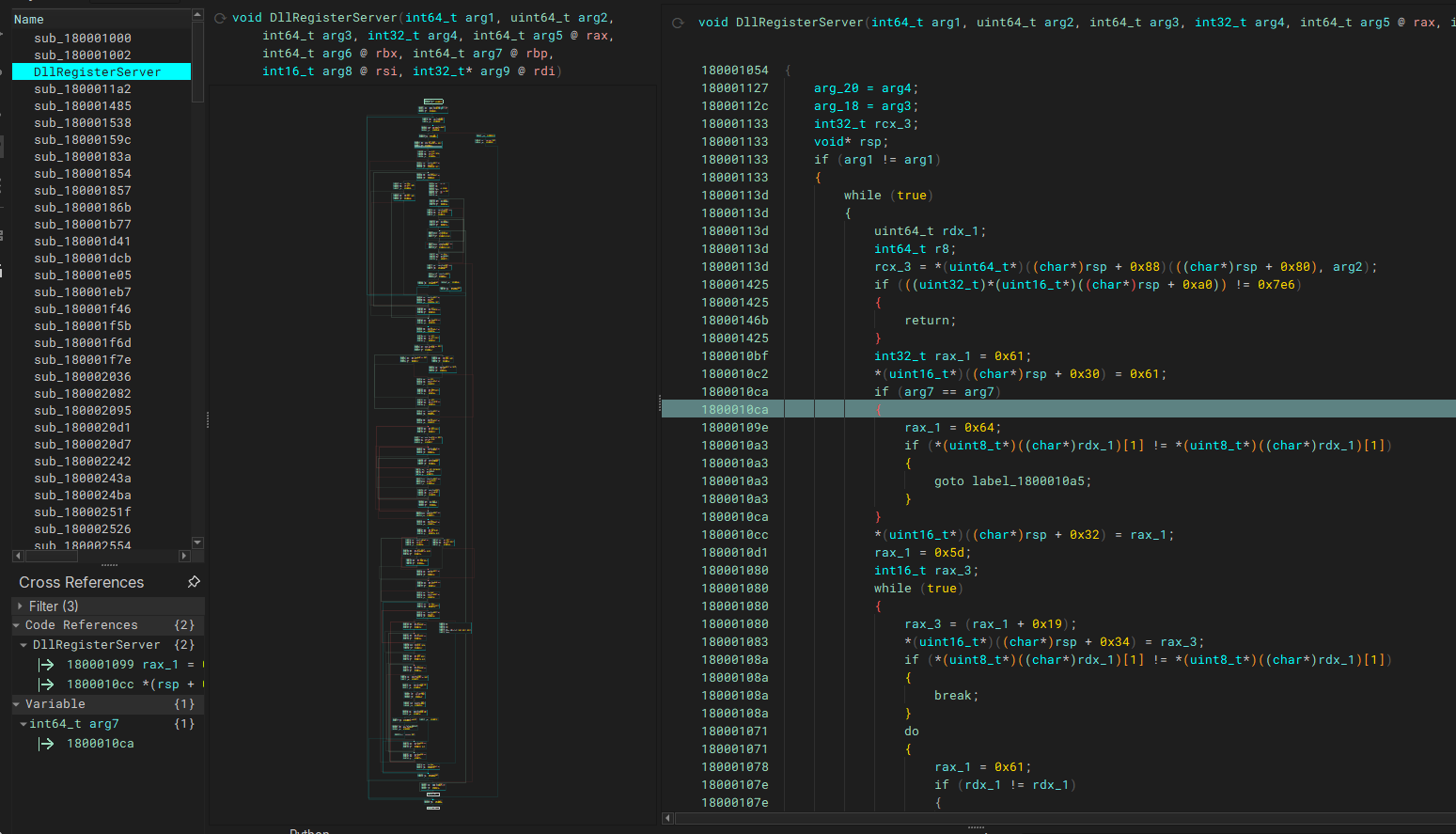
DllRegisterServer (AFTER)
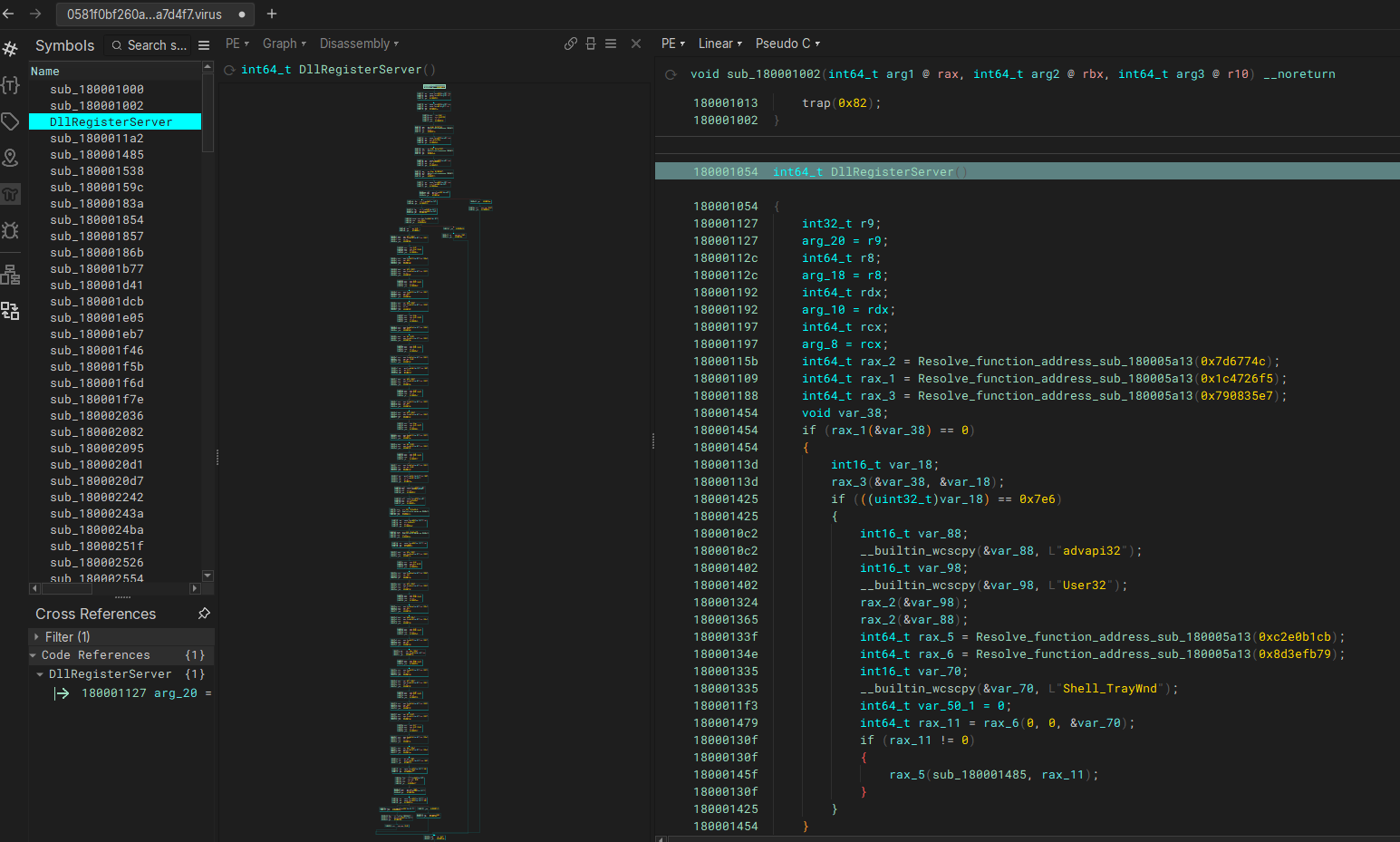
Resolve Function (BEFORE)
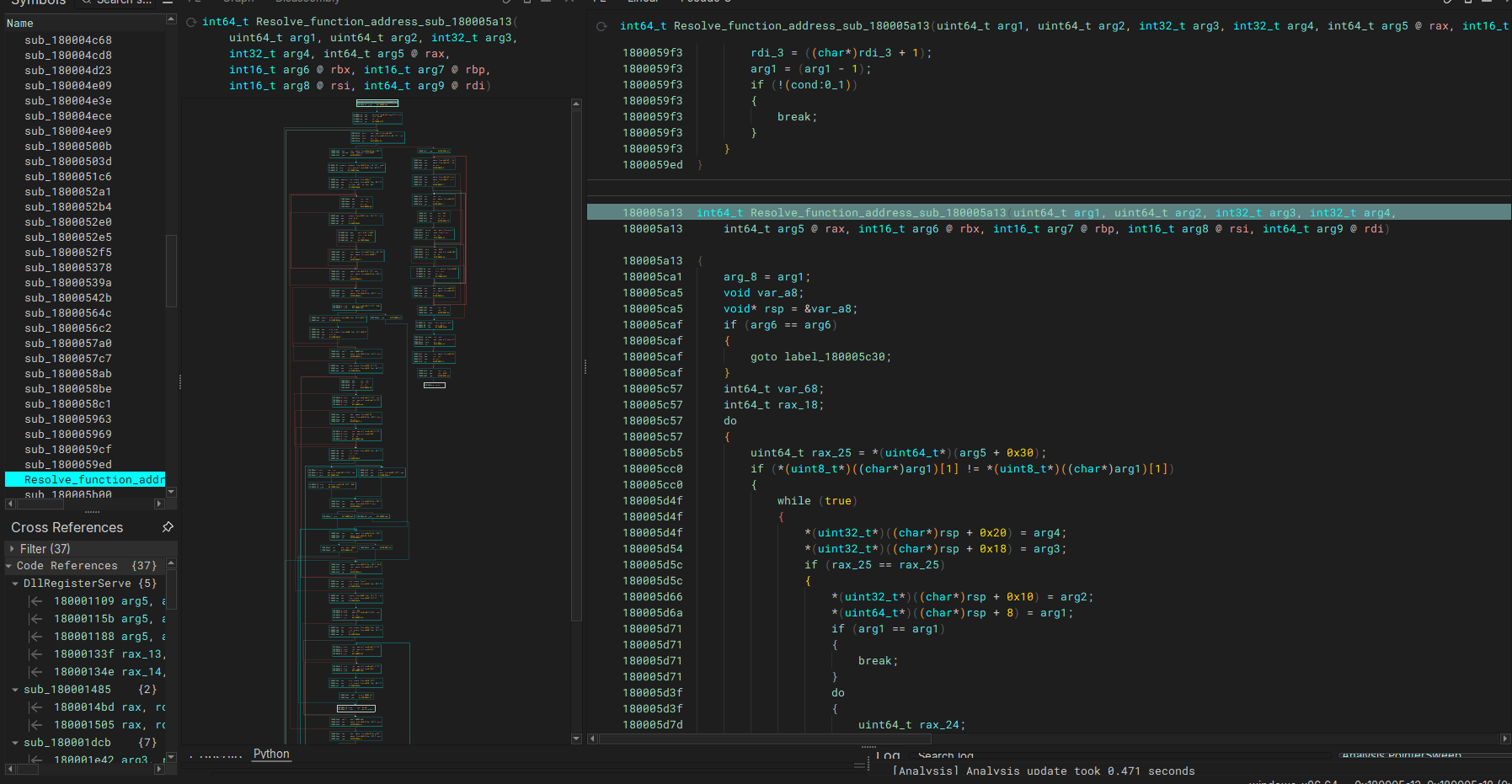
Resolve Function (AFTER)
